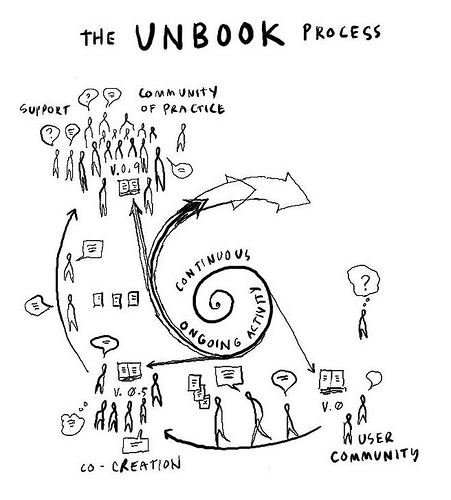Unbook
Found this via Wired UK magazine’s (launch and) May 2009 issue. Pretty interesting idea I find…
A couple of people have asked how unbooks differ from wikis. That’s a great question and led to some reflection and a conversation with my friend Alan Smith (Thanks Alan!) which yielded a few insights.
The top line: Unbooks and wikis are similar in some ways but different in others.
Similarities: Both wikis and unbooks:
1) Are subject to constant and continuous change.
2) Involve communities who are interested in developing content or topic areas.
3) Can have multiple authors.
4) Have multiple defined roles within the community, i.e., reader, author, editor, etc.
Differences:
1) A wiki community is centered around online content in the form of hyperlinked web pages, while an unbook community is centered around printed content in the form of a book.
2) The number of pages in a wiki is conceptually unlimited, while the number of pages in an unbook is limited by its presence in the physical world. The limits may vary but my self-imposed limit is around 400 pages. This forces constant winnowing of the content to a finite set.
3) Because of the size limitation, an unbook’s online content has a tendency to greatly exceed the printed content. This forces more rigor into the editorial process for the printed content. The online content supplements and reinforces the ideas in the book, and also forces change in the book over time. The result is that the unbook is a tightly edited, up-to-date summary of what can be found on the web.
4) A wiki does not have a linear narrative while an unbook does: Before a physical book can be printed the order of its pages must be determined.
5) An unbook has natural offshoots (the physical objects) where the content is frozen in time. This allows one to take a historical look at an unbook in a different way than a wiki. In a wiki, you can look at the evolution of individual pages but it’s difficult to have an “entire snapshot†of the wiki at a particular instant in time.
6) A wiki can include motion and video while an unbook can only point to such things  the print media has constraints. These constraints can be valuable and are well-known: The unbook needs no electicity and never goes down. It can be archived for thousands of years. When reading an unbook one is less subject to interruption by IM, email, dings and beeps, etc.
7) I suppose the primary difference is one of intentions and expectations.
An unbook is a narrative object: a developing account that may change significantly over time, like a children’s story that is told and retold with additions and changes by multiple authors. Like a story an unbook has a clear beginning and end, although those things might change over time.
A wiki is a map object: a virtual space that can be searched, explored and navigated in various ways. A wiki, like a physical space, has many starting and ending points. You can enter a wiki many ways and there is no “end†to a wiki.
These are just one person’s thoughts. I hope you will add your thoughts and comments to this interesting thread.
I however wonder about one thing. How is an Unbook, then, any different from a manuscript that one would share with a peer? Isn’t it (the Unbook) in some ways an idea that’s been around for more than 2000 years, only that it has now been updated with trendier language (open-source, community, etc…)? I don’t know. Maybe.
I guess what I like is the idea of “more rigor into the editorial processâ€Â. Less junk (but potentially more censorship I guess).
** Picture source.


